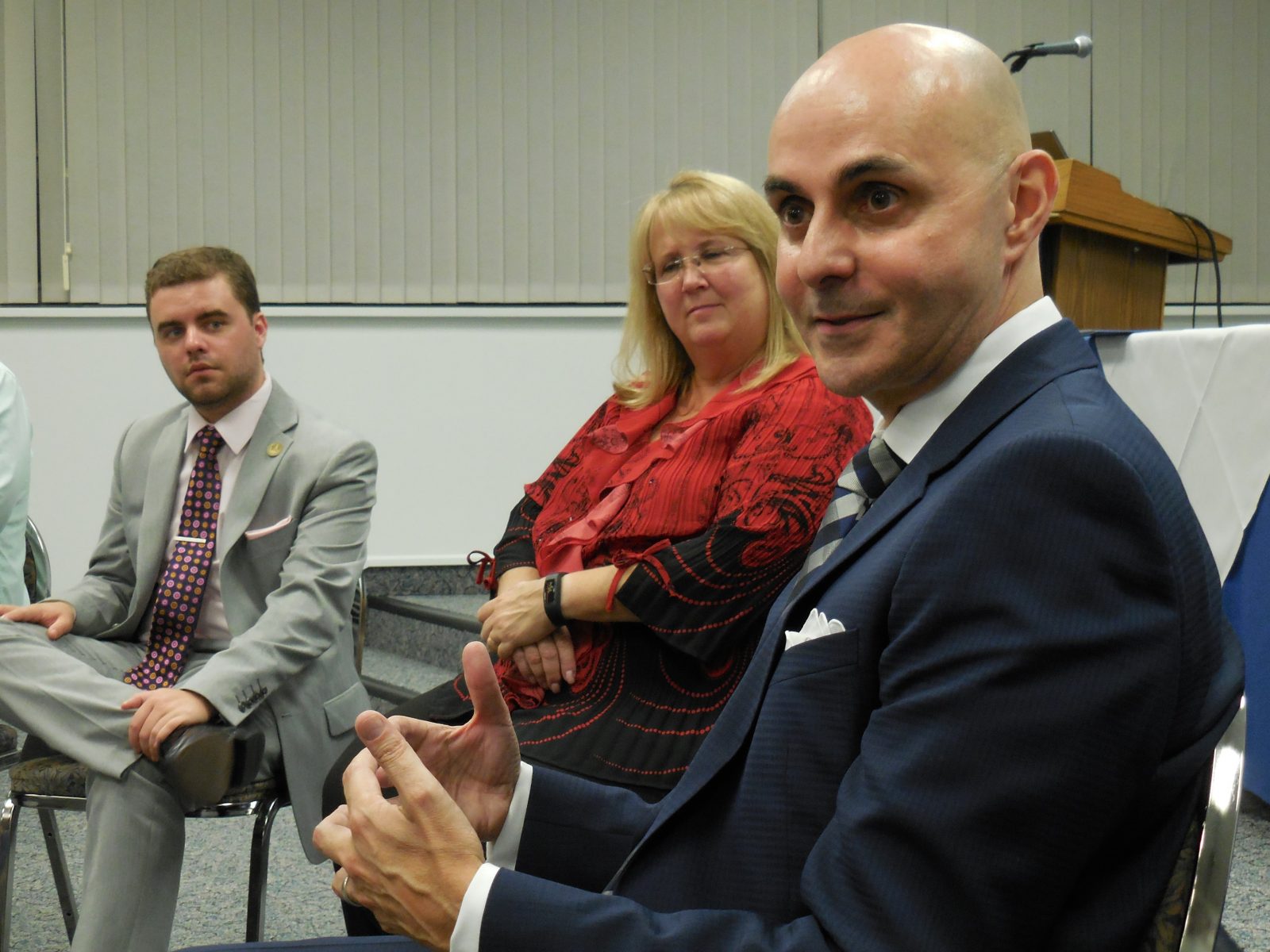WESTFIELD – Westfield State University presidential search finalist Dr. Ramon S. Torrecilha visited with a small group of alumni and staff last night, following a long day of meetings with various constituents on campus.
Torrecilha, a professor of sociology at the University of California in Dominguez Hills, and former provost and vice president of academic affairs there, began his informal talk with answering the question: why WSU?
“For me, the question is how do we make Westfield State University a model, premier institution,” he said.
Torrecilha said enrollment matters, and he would start with an enrollment initiative to discern the optimum enrollment for the university, promoting dual enrollment, degree completion, and international students.
“Your graduation rate is better than most of your peers,” he said, citing a recent increase of 58-64 percent in retention. “I think we can do better in terms of retention and graduation.”
He spoke about a four-year plan he calls “The Westfield Experience.” The first year would focus on living and learning. The second year would be a year of reflection on values, and adopting short term and long term goals. The third year he calls “High Impact” and would include service learning. The fourth year, “The Last Mile,” would include working with the student to transition into the labor force or graduate school.
Torrecilha also spoke about enhancing the relationship between the university and the community, and reaching out to businesses, civic organizations, churches and the religious community in order to establish public and private partnerships.
He said under his presidency there would be more fundraising based on vision, not needs, with strategic priorities. He noted the new science building on campus, and said the state would be looking to WSU to develop partnerships for another academic building and residence hall.
One question to Torrecilha referred to the departure of President Evan Dobelle and the lingering questions in the community.
“What you’re talking about is the healing that needs to happen,” he said. “Your mission, your commitment to students, and the bond you have is greater than any crisis of leadership. I want to serve as your president, not become the presidency.”
He also spoke about the need to be very transparent, and put in place practices to ensure accountability and checks and balances.
“Trust needs to be rebuilt,” he said.
Asked about fundraising, he talked about his role as Executive Vice President for Institutional Advancement at Mills College, a small private college for women in Oakland, California. He said he was in charge of a comprehensive campaign to raise $100 million, and raised $130 million.
He added that fundraising at WSU is “very basic.”
“You have the advantage of reaching out to the alumni base, many who are not in the Westfield area,” he said.
He said he would carry out a feasibility study, and market the campaign to places where there are sizable markets, such as the eastern part of the state
Another question was on the “Westfield Initiative,” noting that many students spend five years completing degrees.
Torrecilha acknowledged that depending on core offerings, it has become difficult for students to graduate in four years.
“There are things that we can do to help students plan,” he said.
He called it “intrusive advising.” He also suggested offering financial literacy to students in their first year, so they can know how they will afford four years.
“It’s true that life happens,” he acknowledged.
He suggested establishing institutional scholarships to help students who are struggling with paying for completion of their degrees.
Asked about increasing diversity on campus, he talked about being able to infuse multiculturalism into the curriculum at Mills College. He said when he started at Mills, there were 10 percent women of color, which increased to 35 percent during his tenure. He talked about creating an environment that is welcoming, one of “inclusive excellence,” and the need to pair diversity with excellence.
Torrecilha was asked if, due to the changing times since WSU was founded by Horace Mann, the history of WSU matters anymore. WSU was the first coed public school in the nation.
“In order to move on you must know where you’ve been,” he said. “Your history anchors your mission. That tradition makes the place that much richer. I would say, it matters a lot.”
“In an institution that I can call home,” He said when asked where he sees himself in ten years. “I hope that it will be WSU.”
He said that he has been very systematic his whole career in taking on responsibilities that would lead him to a presidency. “I hope Westfield is it,” he said.
“It’s been consistent,” he said when asked what surprised him or intrigued him on his campus tour. “The desire to really move the institution forward.”
He said another consistency has been how much people care about the institution.
Torrecilha has an inspiring personal story. Born in Brazil in a very small town, “not even on the map,” Torrecilha spent much of his youth at a state school, where he took classes in the morning and worked in the fields in the afternoon. He moved to the United States at the age of 17 as a migrant worker.
He realized that education was his way out. He learned English, quit the orchard, and moved to Portland, Oregon, where he presented himself to the admissions office at Portland State University. He was given two semesters to prove himself, before his admission was regularized.
Torrecilha went on to get his master’s in sociology from Portland State, and a doctorate from the University of Wisconsin. In 2014, Portland State University gave Torrecilha the Simon Benson Award for Alumni Achievement.
Torrecilha said Westfield State University reminds him of Portland State University, “back then,” when it was a smaller place. He said that he personalizes his experience in meeting students where they are.
“That never left me,” he said of his journey.


